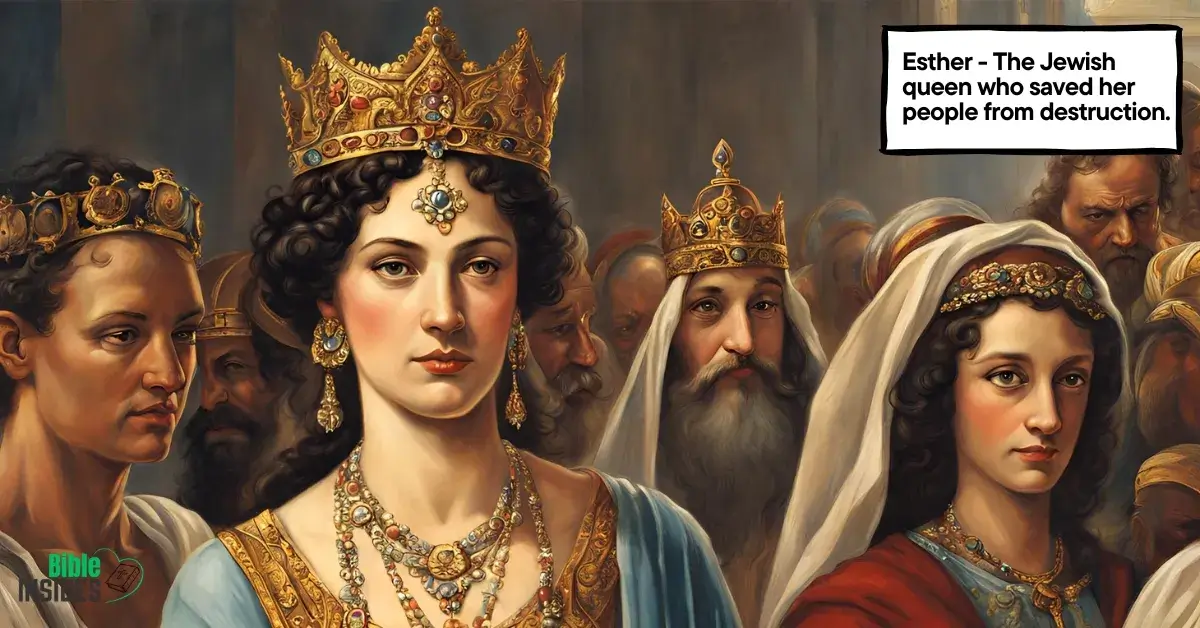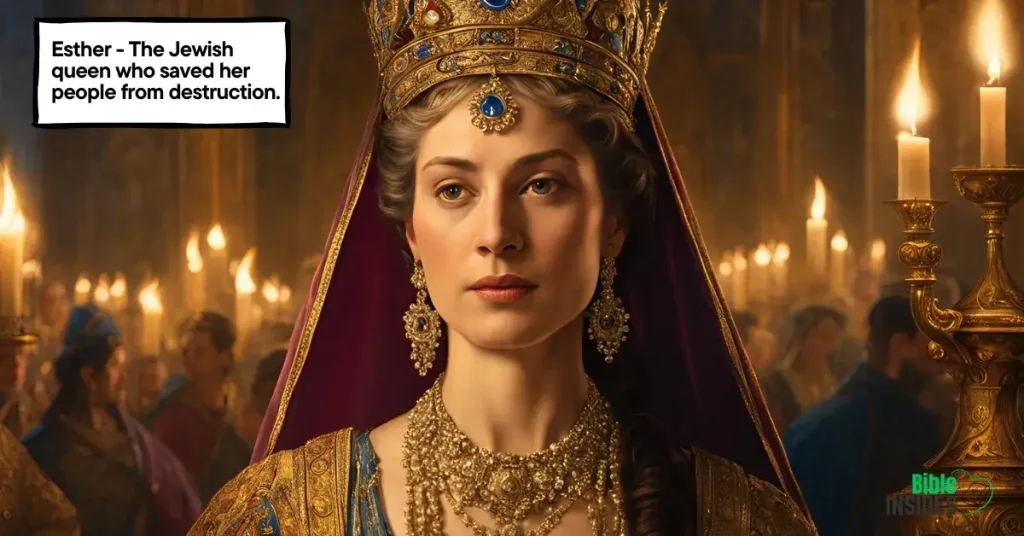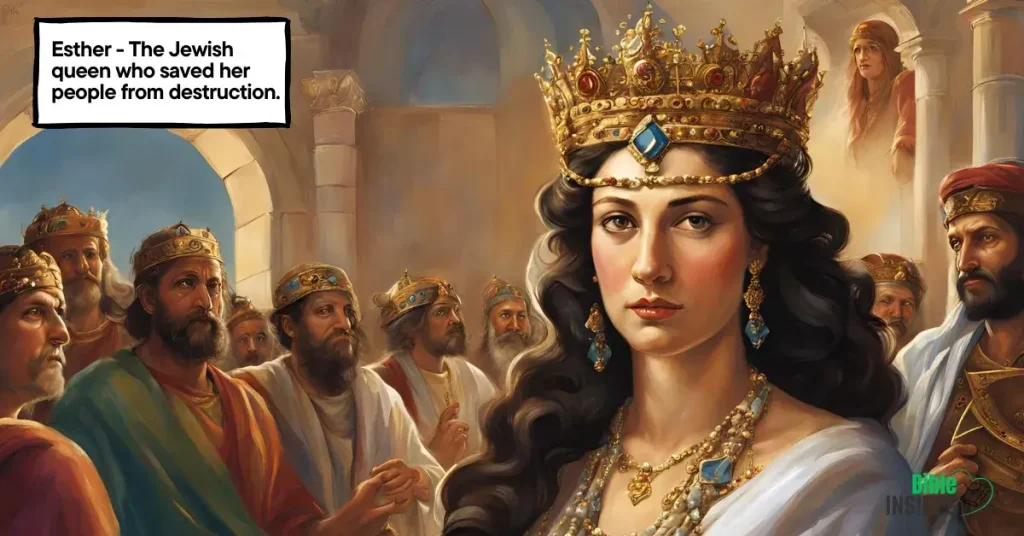Esther: The Jewish Queen of Persian

Esther is the unmarried Jewish woman who was adorned as the Queen of Persia and saved her people from a dangerous conspiracy to destroy them. Esther’s narration is recorded in the Old Testament of the Holy Bible. The Jewish festivity of Purim commemorates this specific liberation of the Jews.
The tale of Esther starts with a king’s dinner. King Ahasuerus (Xerxes) was the son of the famous Persian king Darius I who referred to Ezra, Haggai, and Daniel. The year of the occasion between Esther and King Xerxes was nearly 483 BC. The queen of King Xerxes was vanquished and he sought the virgin queen. Therefore, 400 women were brought for that purpose and Esther, a Jewess named Hadassah in Hebrew was selected as one of the virgins.
The virgins were presented to the king, they were placed in the Harem and supervised the carefulness of Hegai (Esther 2:8), after their congregation thought they were no longer virgins.
They were relocated to the region abandoned by the home of the mistress, a prostitute, where they were placed under the supervision of another impotent named Shaashgaz. (Verse 14)
Esther had been staying in the Citadel of Susa, where the king was also residing. When Esther was selected as a queen, her cousin Mordecai commanded her not to disclose her Jewish history. In addition, he looked around the king’s Harem regularly to observe how she was performing. (Verse 11)
Queen Esther was unaware of the scheme against the Jews although she sought it out when her maids and mistresses told her that Mordecai was in anguish. Esther’s courage and belief in God are evidence of the trust this young woman had in the living God. Her life is a message of God’s supremacy over His Creation. God exercises throughout life to place people, government, and conditions for His Idea and aim. Esther was loyal to abide by and believed in God and humbly obeyed anyway what it might cost. Esther was truthfully an indication of God’s promise, as authorized in Romans.
Esther Means

The name “Esther” originated from Persian and emanated from the old Persian word “Stara” which means “Star”. The name is not justly obtained in the Biblical context though it has also been employed in numerous languages and civilizations. In the Bible, Esther is the Jewish Queen of the Persian King Ahasuerus, familiar with her bravery and part in rescuing the Jewish people of Israel from the scheme to destroy them.
Consequently, the meaning of the name “Esther” is linked to grace, beauty and representatively, the shining characteristics of a star. God exercises throughout life to place people, government, and conditions for His Idea and aim. Esther was loyal to abide by and believed in God and humbly obeyed anyway what it might cost. Esther was truthfully an indication of God’s promise, as authorized in Romans.
Book of Esther

The authorship of the Book of Esther is not surely known. Conventionally, it is supposed to have been composed by Mordecai, who is the significant figure in the narration and Esther’s cousin. The Book of Esther is among the Old Testament books of Hebrew and is part of Ketuvim, the third section of the Hebrew Bible. This book is acquired as the Holy book of both Jews and Christians.
Esther According to the Holy Scripture
There are many verses of the Bible related to Esther such as:
“The king loved Esther more than all the women and she gained grace and esteem in his vision more than all the virgins, so that he set the royal crown on her head and made her queen rather than Vashti” (Esther 2:17)
“Then Queen Esther replied, “If I have gained favor in your sight, O king, and if it please the king, let my life be permitted me for my desire and my people for my appeal” (Esther 7:3)
“And when the king saw Queen Esther standing in the court, she attained benevolence in his vision and he persisted to Esther the golden scepter that was in his hand. Then Esther reached and touched the nib of the scepter. And the king stated to her, “What is it, Queen Esther? What is your appeal? It shall be granted you, even to the half of my kingdom” (Esther 5:2-3)
The Role of Esther

Esther is not just a pretty though woman of grace. In his search for a new queen, the king disrespected various young women, depriving them of their virginity and erecting them aside to the queue of mistresses. However, Esther had no command of what was circumstancing to her, she apprehended her responses with modesty and grace.
Meanwhile, her rotation arrived to be presented before the king, she was permitted to bring whatever she desired with her and won the privilege. Despite contrivances, she opted for assurance:
“She inquired for nothing other than what Hegai, the king’s impotent who was in the custody of the harem, advised. And Esther gained the kindness of everyone who saw her” (Esther 2:15)
Esther As a Queen
Esther‘s character opened the door for her and she adorned as the queen. Perpetually, Esther retained her legacy confidential as commanded by her cousin Mordecai. Esther had the chance to end up the difficulties. Concentrating two of the king’s administrators violently conspiring to murder the king, Mordecai states Esther who then noticed it to the king, believing Mordecai. After an inquiry, the truth is verified and the instigators are perforated. More confrontation emerged because of a man named Haman, crowning in an eminent revenge.
God’s Redemption by Esther
Esther bravely disguised her royal strings and subbed in a place where she might demise. Rather than death, the king gave her benevolence, inquiring her what she wished. With her foremost appeal, she started a project that justly God could have granted to her. Because of God’s salvation, Haman was invoked, Mordecei was dignified and the Jews were authorized to protect themselves.
“For the Jews, it was a time of pleasure and joy, happiness and respect. In every province and in every city to which the command of the king came, there was joy and happiness among the Jews, with feasting and celebration” (Esther 8:16-17)
Frequently Asked Questions
Conclusion
Esther’s birth name was Hadassah. She was of the clan of Benjamin and residing during the period of Israel was banished and ultimately adorned queen who rescued her all people. Esther reminds us that nothing is impractical with God. God created Esther to be pretty, so she would take part in the King’s beauty competition to adorn as queen.






